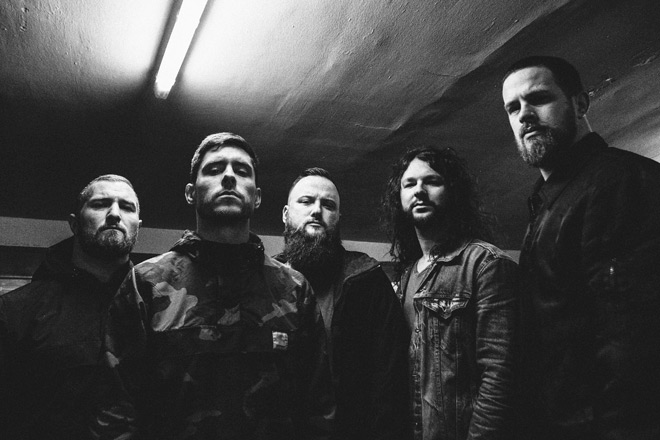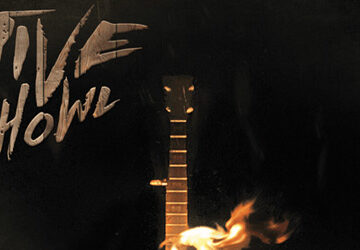
Formed in Knoxville, Tennessee, in 2006, Deathcore quintet Whitechapel know a little something about blistering Metal. Their 2007 debut, the Jack The Ripper-themed The Somatic Defilement, would lead to five additional albums over the next nine years of their career, ranging from 2008’s This Is Exile to 2016’s Mark of the Blade. Not ones to rest on their laurels, the band are dedicated road dogs who have shared stages with the diverse likes of The Black Dahlia Murder, Unearth, Suicide Silence, Carnifex, Motionless In White, The Acacia Strain, Miss May I, The Plot in You, and, most recently, Chelsea Grin. They are also veterans of Summer Slaughter, Mayhem Fest, and the Vans Warped Tour.
Ready to deliver a career-defining record, Whitechapel — Vocalist Phil Bozeman, Guitarists Ben Savage, Alex Wade, and Zach Householder, Bassist Gabe Crisp — present their seventh full-length, The Valley. A deeply personal album based off events in Bozeman’s life, the collection’s title is actually derived from Hardin Valley, west of Knoxville, Tennessee, where he grew up. Again produced by Mark Lewis (Cannibal Corpse, The Black Dahlia Murder), the 10-song disc features the exceptional Navene Koperweis of Entheos (formerly of Animals As Leaders and Animosity) on the drum kit.
There’s no denying the infectiousness and the dark desperation of “When a Demon Defiles a Witch,” the emotional gut-punch that opens The Valley. Here, backstory is especially important. This being a personal record, Bozeman sings of his mother, who suffered from a myriad of mental health problems including Dissociative Identity Disorder. Reportedly, she had over 34 distinct personalities, each appearing throughout her personal journals. So, the beast of the lyrics is not actually Bozeman’s stepfather, but instead a demon named “Mycar,” whom she detailed in her writing. In fact, some of the lyrics are lifted straight from her journals, making the song that much more haunting. In this sense, it’s the perfect kick-off to an album that delves into the abyss of one man’s youth and its lingering, weighty effects.
For fans that can’t handle Bozeman actually singing, fear not! The brutal assault returns on “Forgiveness Is Weakness,” as we celebrate the death of the human demon in Bozeman’s young life, and confess that although the years have gone, the pain is still very constant. It’s suitably disturbing, the scars that run deep obvious in the track’s bitter rage. Similarly, the vile stomp of “Brimstone” seeks to kill, torture, and terrorize in the name of vengeance. Reportedly based off a sadistic dream that Bozeman experienced as a teenager, the track glorifies in the idea of taking the power back to make your tormentor your bitch.
For “Hickory Creek,” Bozeman pushes aside his incendiary growls and goes for straight, clean vocals that prove that the man can sing! With phenomenal guitar work, the end result is a track that goes the polar opposite of the heavy that you know and love from Whitechapel: this, like the entirety of the album, is heavy in its rawness. Leaving home, yet unable to let go — it all fuses to create a standout offering.
Djent-y crunchiness explodes into “Black Bear” and the devilish growls return on full blast. Utilizing the apex predator, the black bear, as a metaphor for his stepfather, Bozeman paints another alarming picture. A song that revels in the blackness of death, you can’t help but sing (or growl) along to the entirely bleak: “As they lay me down to sleep / I pray to the Lord to put me six feet deep.”
Continuing to brutally assault the senses, “We Are One” sits on the cusp of madness, vacillating between savior and murderer. Meanwhile, a killer solo provides foreshadowing for what is to come on “The Other Side.” Equally harsh, the track celebrates making it out of hell alive and doing your best to move forward. Returning clean vocals into the mix, “Third Depth” laments the pain that Bozeman still feels, while bluntly confessing that he’s not stable. The title? Well, that’s supposedly a reference to the basement of his childhood home where he would escape to be alone with his thoughts.
You can’t escape your problems is the message at the heart of the tormented pleas from son to mother in “Lovelace,” before the album culminates in the brutally unfiltered lyrics of “Doom Woods,” just as bleak as its apt title but with some wonderfully melodic guitar work. In fact, if you walk away from The Valley feeling great about life, then you probably don’t have much of a heart. Musically, it’s a phenomenal epic that hits hard and is, in this sense, guaranteed to put a smile on fans’ faces. However, the lyrical content here is so bloody raw and unfiltered that it would be impossible to say that this is an album that traffics in good feels.
While this is such a personal album for Bozeman, it seems necessary to note that his bandmates — Savage, Wade, Householder, and Crisp — have all stepped up their already exceptional games to give killer performances throughout The Valley. They work as a fully cohesive unit, complementing one another flawlessly without any one musician seeming to beg for attention.
There is absolutely no comparison between The Valley and Architect’s Holy Hell, musically, however, they share a bold, raw heaviness of emotion. It’s not easy to wear your torn, black heart on your sleeve in front of a judgmental and hyper-opinionated world, but with The Valley, Whitechapel prove that music is catharsis and rules are always meant to be broken. Astounded, Cryptic Rock give Whitechapel’s The Valley 5 of 5 stars.






No comment